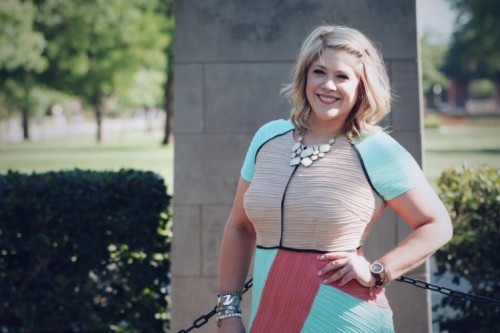
Just two months on the job helping youth aging out of foster care in Oklahoma City, Lindsay Davis has already found the best part of her job as a YVLifeSet specialist.
“I think the best thing is watching them get excited about how YVLifeSet can partner with them to achieve the goals they’ve only dreamed about,” she said. “Seeing their eyes light up and ask, ‘Seriously, you can help me with this?’”
Always having a heart for foster care children, Lindsay said she always worried about what happens once they age out of state custody. A growing body of research across the country shows that young adults face many obstacles when they turn 18 and age out of the foster care system.
“I knew if I had the opportunity to work with youth, teaching them skills to make them a more capable adult, I would do it,” she said. “I wanted a job that was more than just being a caseworker that worked with children and teens. I wanted to work for a company that believed so much in what they were doing and Youth Villages was that place.”
Born and raised in Tulsa, Oklahoma, Lindsay stayed true to her state roots by first attending Oral Roberts University for her undergraduate studies and then the University of Oklahoma for a Masters in human relations with a concentration in mental health/LPC.
“One degree just wasn’t enough,” she joked. “I loved counseling and psychology so much that the thought of not going further with my education was not satisfying.”
Lindsay begins her workdays by checking in with the youth and talking regularly with their caseworkers and therapists about their collaboration of services. She ensures her planned sessions include the goals each youth has set identified as a priority.
One of the bigger challenges she’s faced as a specialist, Lindsay said, is allowing herself to take the time learn and grow. She said she felt that she was actually making the job harder by adding pressure on herself to be perfect.
“I am a creature of habit. I love having a schedule and a checklist. I am used to seeing a task done once and then doing it myself. This job is constantly on the move. Nothing is the same,” she said. “The youth you work with have unstable schedules that can change at the drop of a hat. The treatment planning process is always evolving.
“I’m thankful for supervisors and an assistant director who took the time to sit down with me and tell me to give myself grace,” she said. “Giving myself grace, time and patience has been the best way to work through any struggle I’ve faced. I think it’s made me a better specialist.”
Lindsay is already collecting memorable moments as a specialist.
“I had a youth, who when we first met at our admission session, stated the intention of earning her GED and even had educational goals laid out beyond the GED to include going to college and onto nursing school,” Lindsay recalled. “When I asked the youth to begin researching which program she wanted to start at, I received a text message at 7 a.m. the next day saying she already knew what we needed to do.”
It took five weeks for this youth to register for a GED course.
“To the youth, this was just signing up for the course,” she said. “To me, this was just a small, stepping stone toward this youth’s first educational goal being accomplished. When we walked out in the parking lot, we stopped and I started cheering for her and, of course, the youth looked at me like I was nuts, but when I told her these small steps deserve to be celebrated just like the big steps, her attitude changed and yes, she even jumped up and down with me.”
